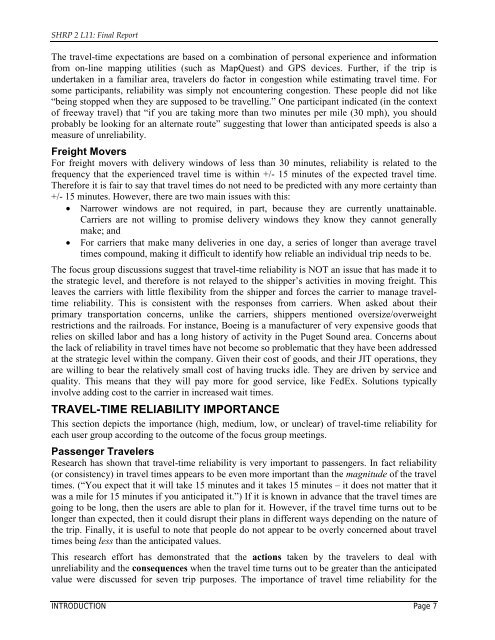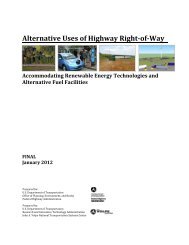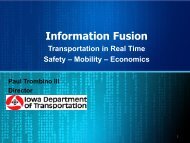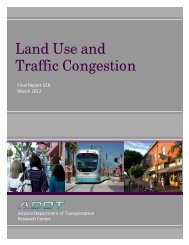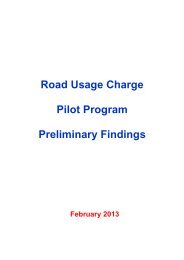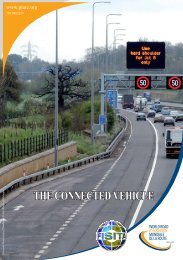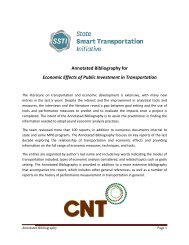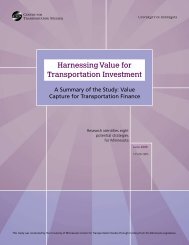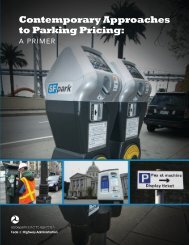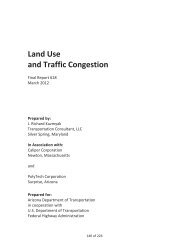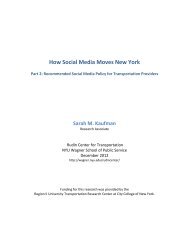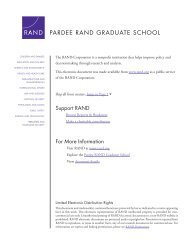Evaluating Alternative Operations Strategies to Improve Travel Time ...
Evaluating Alternative Operations Strategies to Improve Travel Time ...
Evaluating Alternative Operations Strategies to Improve Travel Time ...
You also want an ePaper? Increase the reach of your titles
YUMPU automatically turns print PDFs into web optimized ePapers that Google loves.
SHRP 2 L11: Final Report<br />
The travel-time expectations are based on a combination of personal experience and information<br />
from on-line mapping utilities (such as MapQuest) and GPS devices. Further, if the trip is<br />
undertaken in a familiar area, travelers do fac<strong>to</strong>r in congestion while estimating travel time. For<br />
some participants, reliability was simply not encountering congestion. These people did not like<br />
“being s<strong>to</strong>pped when they are supposed <strong>to</strong> be travelling.” One participant indicated (in the context<br />
of freeway travel) that “if you are taking more than two minutes per mile (30 mph), you should<br />
probably be looking for an alternate route” suggesting that lower than anticipated speeds is also a<br />
measure of unreliability.<br />
Freight Movers<br />
For freight movers with delivery windows of less than 30 minutes, reliability is related <strong>to</strong> the<br />
frequency that the experienced travel time is within +/- 15 minutes of the expected travel time.<br />
Therefore it is fair <strong>to</strong> say that travel times do not need <strong>to</strong> be predicted with any more certainty than<br />
+/- 15 minutes. However, there are two main issues with this:<br />
• Narrower windows are not required, in part, because they are currently unattainable.<br />
Carriers are not willing <strong>to</strong> promise delivery windows they know they cannot generally<br />
make; and<br />
• For carriers that make many deliveries in one day, a series of longer than average travel<br />
times compound, making it difficult <strong>to</strong> identify how reliable an individual trip needs <strong>to</strong> be.<br />
The focus group discussions suggest that travel-time reliability is NOT an issue that has made it <strong>to</strong><br />
the strategic level, and therefore is not relayed <strong>to</strong> the shipper’s activities in moving freight. This<br />
leaves the carriers with little flexibility from the shipper and forces the carrier <strong>to</strong> manage traveltime<br />
reliability. This is consistent with the responses from carriers. When asked about their<br />
primary transportation concerns, unlike the carriers, shippers mentioned oversize/overweight<br />
restrictions and the railroads. For instance, Boeing is a manufacturer of very expensive goods that<br />
relies on skilled labor and has a long his<strong>to</strong>ry of activity in the Puget Sound area. Concerns about<br />
the lack of reliability in travel times have not become so problematic that they have been addressed<br />
at the strategic level within the company. Given their cost of goods, and their JIT operations, they<br />
are willing <strong>to</strong> bear the relatively small cost of having trucks idle. They are driven by service and<br />
quality. This means that they will pay more for good service, like FedEx. Solutions typically<br />
involve adding cost <strong>to</strong> the carrier in increased wait times.<br />
TRAVEL-TIME RELIABILITY IMPORTANCE<br />
This section depicts the importance (high, medium, low, or unclear) of travel-time reliability for<br />
each user group according <strong>to</strong> the outcome of the focus group meetings.<br />
Passenger <strong>Travel</strong>ers<br />
Research has shown that travel-time reliability is very important <strong>to</strong> passengers. In fact reliability<br />
(or consistency) in travel times appears <strong>to</strong> be even more important than the magnitude of the travel<br />
times. (“You expect that it will take 15 minutes and it takes 15 minutes – it does not matter that it<br />
was a mile for 15 minutes if you anticipated it.”) If it is known in advance that the travel times are<br />
going <strong>to</strong> be long, then the users are able <strong>to</strong> plan for it. However, if the travel time turns out <strong>to</strong> be<br />
longer than expected, then it could disrupt their plans in different ways depending on the nature of<br />
the trip. Finally, it is useful <strong>to</strong> note that people do not appear <strong>to</strong> be overly concerned about travel<br />
times being less than the anticipated values.<br />
This research effort has demonstrated that the actions taken by the travelers <strong>to</strong> deal with<br />
unreliability and the consequences when the travel time turns out <strong>to</strong> be greater than the anticipated<br />
value were discussed for seven trip purposes. The importance of travel time reliability for the<br />
INTRODUCTION Page 7


